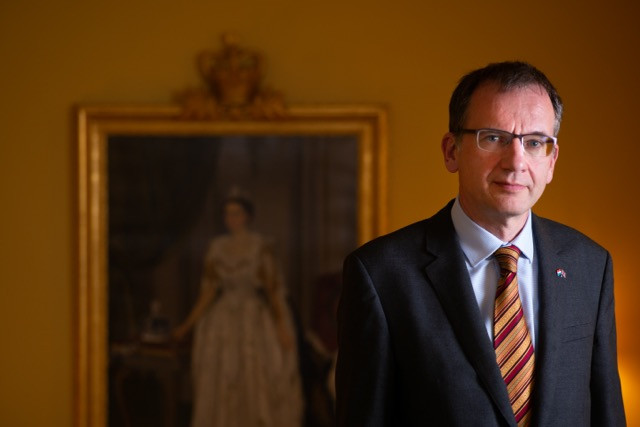British ambassador to Luxembourg John Marshall told Delano that he was delighted that an agreement with the EU on a trade deal had been reached after nine months of negotiations. “This is the largest bilateral trade deal in the world and the first zero tariff zero quota agreement that the EU has reached with a trading partner. But it covers so much more too including trade in services, transport and internal security. With a trade agreement in place as we come to the end of the transition period on 31 December we will be well-placed to begin a mutually productive new relationship with the EU and its member states,” Marshall said. “It is to the immense credit of David Frost and Michel Barnier and their respective teams that they have brought these negotiations to a successful conclusion,” the ambassador added.
“We will continue to be close allies and partners in many areas, whether cooperating within NATO to enhance the security of our continent, collaborating on science, research and innovation or working together to tackle the global challenges we face, including climate change and the Covid-19 pandemic. From the start I have been confident that the future relationship between the UK and the EU and its member states will remain a strong one because we are natural allies, neighbours who share the same values and obvious friends.”
BiE: fish given more attention than loss of free movement
British in Europe (BIE), the coalition of grassroots citizens’ organisations (including British immigrants living in Luxembourg) that give UK citizens in the EU a voice in the Brexit negotiations, also issued a statement. BIE said that although any future relationship deal is better than no deal, “today is not a day to celebrate all that has been lost.” Most pressing for the group is that loss of freedom of movement. “The free movement of fish has been given many, many more hours, weeks and months of attention in the future relationship negotiations than were ever devoted to considering the impact of the loss of free movement on the lives of 1.2 million UK citizens in the EU, although many rely on it for their livelihoods and to support their families.” The deal, they say, is better than no deal, “but does not and cannot replace the enormous and life-changing benefits of EU membership and citizenship that we have enjoyed since 1973”
Luxembourg MEP Christophe Hansen (CSV) who is the European Parliament’s Brexit rapporteur for the European Parliament's trade committee, wrote on Twitter on 24 December that although--in what he called a “low blow”--the parliament would not have time to properly scrutinise the agreement, “as responsible politicians we will not oppose, to protect our citizens&business”. It was the only way to avoid a cliff-edge after 31 December, Hansen said.
Foreign minister Jean Asselborn (LSAP), in an interview in the Luxemburger Wort (here in German), said that the deal was “not all perfect” but that a deal was better than no deal. Asselborn reckons that the problems caused by the French blocking entry to traffic from the UK, which caused ten thousand trucks to be stuck near Dover and led to Lufthansa flying in fruit and vegetables, was “something that Boris Johnson also perceived as a danger to his country.”
A no-deal scenario may also have “significantly increased” the likelihood of a new Scottish independence referendum, the foreign minister said. And although he welcomes the agreement’s provision for the UK to remain in the Paris climate accord, he said it was “a pity for the younger generations that Great Britain wants to leave the Erasmus study exchange programme.”
